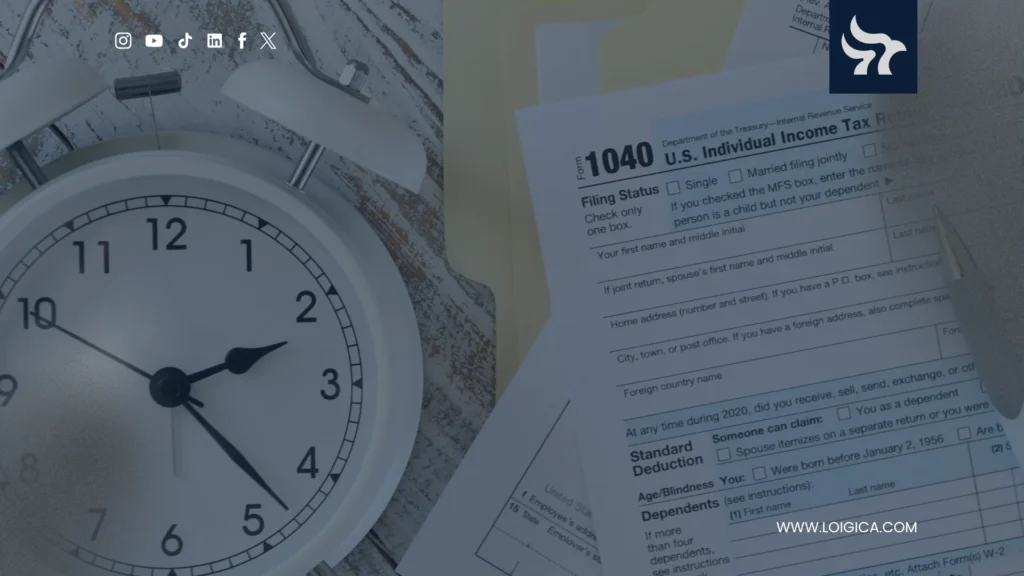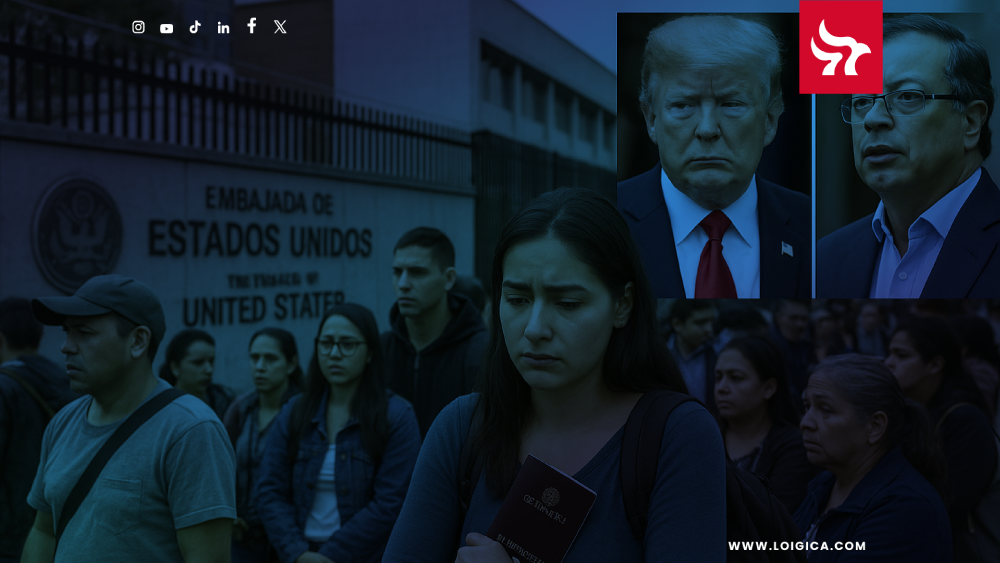Updated as of November 13, 2025. This text is informational and does not constitute individual legal advice.
In recent months, the relationship between Donald Trump’s administration and Gustavo Petro’s government has moved from diplomatic tension to open confrontation. Beyond headlines, many Colombians are asking a very concrete question: Does this affect my chances of traveling, studying, investing or living in United States?
As an immigration law firm, LOIGICA does not claim to interpret global geopolitics or provide ideological readings of the bilateral relationship. Our focus lies elsewhere: how these political decisions translate into consular practice and into the daily lives of people who depend on a visa or an immigration process.
1. The context: from deportation flights to revocation of Petro’s visa
The most visible breaking point began in early 2025, when the Colombian government refused to receive flights with nationals deported from United States, citing concerns about the treatment of returnees. In response, the Trump administration threatened tariffs and sanctions, and used immigration policy as a pressure tool.
In that context, on January 27, 2025, hundreds of visa appointments at the United States Embassy in Bogotá were cancelled, leaving applicants who had waited months —and in some cases years— with nothing more than a letter explaining that their interviews were cancelled due to the dispute over deportation flights.
The tension did not stop there. In September 2025, the Department of State revoked President Gustavo Petro’s visa after an event in New York where he called on United States soldiers to disobey Trump’s orders in the context of the war in Gaza. The United States government labeled his remarks “reckless and incendiary”.
On top of that, there have been personal sanctions and accusations related to drug trafficking and regional security, which many analysts see as one of the most difficult moments in the recent relationship between Bogotá and Washington.
In short: the political relationship is at its most strained point in years, and visa policy has already been used openly as a tool in that dispute.
2. What has not changed: the legal immigration framework
It is important to distinguish governance style from the letter of the law:
Immigration categories —tourism, study, employment, investment, talent, family and others— remain in place.
There is no new law “banning” Colombians from migrating to United States or closing, by nationality, the paths to residence based on employment, investment or family.
The difference lies in how that legal framework is administered:
How quickly —or slowly— appointments are scheduled.
How much additional scrutiny is applied to certain nationalities.
How strictly consular officers interpret “immigration risk” or “intent to remain”.
In other words: the legal door is still there, but the hallway has become narrower and more closely watched.
3. The Embassy in Bogotá: more pressure on an already overloaded system
Even before this crisis, obtaining a visa appointment at the United States Embassy in Bogotá meant lengthy waiting times, in some cases up to two years for visitor and business visas (B1/B2).
The decision to cancel hundreds of appointments on January 27, 2025, revealed something crucial for understanding the current moment:
the visa calendar can move for political reasons, not only operational ones.
For Colombian citizens, this translates into:
A higher risk of last-minute cancellations or rescheduling.
Greater uncertainty when planning trips, studies or family relocations.
An environment in which any documentary error or inconsistency in the interview carries more weight.
Although consular services have gradually normalized, the message is clear: in a context of political friction, Washington is willing to use visa policy as leverage.
4. How does this affect different profiles of Colombians?
4.1. Those applying for visitor or business visas (B1/B2)
They are the most numerous and the most directly affected by:
Long waiting times.
Mass cancellations like those in January 2025.
Greater emphasis on demonstrating “intent to return” to Colombia.
In an environment where irregular migration is at the center of the political debate, officers tend to be stricter when assessing whether a person has clear and verifiable reasons to come back: stable employment, ongoing projects, family ties, assets, travel history and so on.
4.2. Students, skilled workers and talent profiles
Categories for study or work —F, J, certain H categories, O, P and others— are still operating, but within a more demanding framework:
The Embassy in Bogotá has been dealing with tight calendars and prioritization, which can affect the timing of interviews and therefore the start date of academic programs or employment contracts.
It is reasonable to expect an increase in Requests for Evidence (RFEs) and more in-depth interviews for applicants from countries at the center of the migration debate.
For these profiles, being technically eligible is not enough; applicants must present a coherent file, well documented and clearly aligned with the visa category they are requesting.
4.3. Colombian investors and business owners
Alongside political tension, procedural adjustments and tighter requirements have appeared for investment visas and other corporate structures, demanding:
Clear corporate structures.
Traceability of funds.
Evidence of job creation and credible business plans.
In a sensitive diplomatic environment, improvised projects that are poorly documented or cannot withstand serious tax and corporate review have less margin for error. By contrast, well-designed structures —from both the immigration and corporate law standpoint— gain relevance as a signal of seriousness and compliance.
4.4. Colombians already in United States
The tightening is not only felt “from the outside.” For those already on United States soil:
Any status violation (working without authorization, overstaying, changing programs without notice, etc.) becomes more dangerous.
Changes of status, extensions and adjustments may be examined more closely, especially when they involve nationalities associated with debates over deportations and border control.
In practical terms, this means many decisions that could once be made “on the fly” now require prior legal strategy.
5. Beyond the rhetoric: real implications for people
From an immigration law perspective, the Trump–Petro tensions leave several key insights for Colombians:
Immigration policy is being used as a diplomatic pressure tool.
The mass cancellation of visa appointments in Bogotá over a disagreement about deportation flights is a direct and recent example.The burden of proof is higher.
Incomplete forms, contradictory documents or poorly told stories have less tolerance in a context where the political instruction is to “be tougher.”Uncertainty increases.
Beyond written law, the climate can change quickly: personal sanctions, revocation of official visas, tariff threats and public statements all influence how Colombia is perceived within the decision-making structure of the United States government.Not all profiles are affected the same way.
The occasional tourist and the person trying to build a multinational operation, a graduate program or a permanent residence face different impacts, but all operate under the same stricter political environment.
6. LOIGICA’s perspective: immigration law in a time of tension
LOIGICA is not a foreign ministry or a political think tank. We do not speculate on diplomatic strategies, and we do not operate from sympathy or hostility toward any administration.
Our role is different:
To translate a complex political context into specific, manageable risks for individuals and companies.
To design immigration and corporate strategies that remain solid even when the political climate is not favorable.
To support Colombians —in and outside Colombia— who want to study, work, invest, protect their assets or reunite with family in United States, with structured processes, robust evidence and an updated reading of consular practice.
7. Conclusion: the door is not closed, but the margin for error is smaller
The tensions between Trump and Petro have made one thing very visible to immigration lawyers:
migration is never just a legal issue; it is always crossed by politics.
Today, the reality for Colombians is twofold:
The law still offers clear pathways for tourism, study, employment, investment, talent and family.
The political context makes every step require more care, more planning and less improvisation.
In this scenario, the question is not whether one can migrate or not, but rather how to do it with the lowest possible exposure to sudden changes, discretionary decisions or avoidable mistakes.
8. What can you do if this context worries you?
If you are Colombian and:
You have a visa appointment scheduled or recently cancelled.
You are considering an investment, work or study project in United States.
You are already in United States and need to adjust, extend or correct your status.
It is advisable to obtain a personalized evaluation of your case in light of current regulations and the present state of the bilateral relationship.
Every situation has nuances that cannot be resolved with generic formulas. A well-designed strategy can be the difference between a process that moves forward and one that stalls over a detail at the worst possible moment.
Schedule a consultation with LOIGICA®: in one session we organize your profile, evidence, and timeline so you leave with a concrete plan.
📩 marketing@loigica.com | 🌐 www.loigica.com
This blog was written with asistance of generative AI. It is provided for informational purposes only. It does not constitute legal advice. The information presented here is based on general principles of U. S. immigration laws, as well as general information available for public search on public matters, as of the date of publication. Immigration laws and regulations are subject to change and individual circumstances may vary. If you need expert counceling on immigration matters, contact one of our attorneys.

Tax Season 2026: Key Dates, IRS Filing Updates, and What Business Owners Must Know

How to Avoid Piercing the Corporate Veil: Proper Assets Separation



